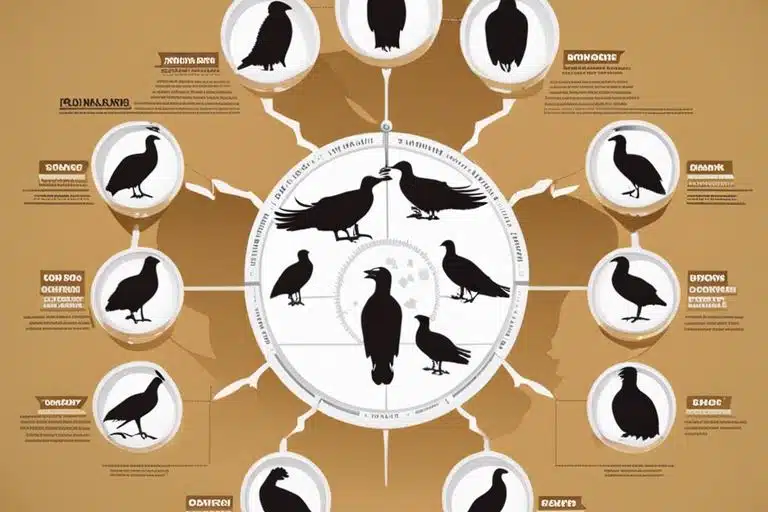You may have seen them soaring high above, or perched on a branch with their keen eyes scanning the surroundings. Vultures are crucial creatures in the ecosystem, playing a vital role in cleaning up the environment. Let’s examine into the fascinating world of vultures and explore their significance in nature.
Vultures, both old world and new world species, are masters of scavenging. They have the incredible ability to spot a carcass from miles away, ensuring no meal goes to waste. Old world vultures, such as the African white-backed vultures, are known for their impressive wingspans and efficient feeding habits. These majestic birds play a crucial role in maintaining the balance of their habitats by disposing of decaying carcasses.
When considering new world vultures like the turkey vulture and black vulture, their unique characteristics set them apart. Turkey vultures, with their keen sense of smell, can easily locate carrion to feed on. On the other hand, black vultures rely on their sharp eyesight to find food sources. Both species contribute to the ecosystem by controlling the spread of diseases through their scavenging activities.
There are numerous vulture species across the Americas, each with its own fascinating traits. From the impressive condors, like the Andean condors soaring effortlessly through the skies, to the diverse range of birds of prey within the cathartidae family, vultures come in various shapes and sizes.
One of the most intriguing aspects of vultures is their feeding behavior. They gather on carcasses, utilizing their powerful beaks to tear apart flesh and digest bones to ensure nothing goes to waste. Despite their scavenging nature, vultures have often been misunderstood and faced threats such as habitat loss and illegal hunting.
As we strive to protect these magnificent creatures and appreciate their importance in the ecosystem, it’s crucial to understand the role vultures play in maintaining the environment’s health and balance. Through education and conservation efforts, we can ensure the survival of vulture species for generations to come.
Key Takeaways:
- Vultures Play Important Ecological Role: Vultures serve as nature’s garbage collectors, helping keep the environment clean by scavenging carcasses and removing potentially dangerous, bacteria-ridden remains.
- Diverse Vulture Species: There are numerous vulture species across the world, including New World vultures like the turkey vulture and old world vultures such as the African white-backed vulture, each with unique characteristics and adaptations.
- Threats to Vulture Populations: Vultures face challenges from habitat loss, illegal hunting, and poisoning, emphasizing the critical need for conservation efforts to protect these imperative predators.

Scientific Classification
Taxonomy of Vultures
Some vultures belong to the family Cathartidae, which includes both New World vultures and Old World vultures. These scavenging birds are known for their ability to find and feed on carcasses, helping to keep ecosystems clean. Vultures lack a feathered head and neck, and many species have a bare head that aids in keeping cool while feeding. They also have strong stomach acid that allows them to digest bones.
Types and Species
The Old World vultures are primarily found in Europe, Africa, and Asia, while the New World vultures inhabit the Americas. Some well-known species include the Turkey vulture, Rüppell’s griffon vulture, and the Bearded vulture. Vultures usually feed on carrion and play a crucial role in the ecosystem by cleaning up dead animals. The 23 species of vultures show a wide range of adaptations for scavenging and soaring in the skies. After feeding, vultures may head back to their nests to rest and digest their meal.

Fast Facts
Physical Characteristics and Behavior
Not only are vultures important scavengers, but they also play a crucial role in maintaining the ecological balance. Vultures, including the New World and Old World species, have distinct physical characteristics and behavior that help them thrive in their environment. With their impressive wingspan, vultures soar effortlessly for miles in search of food sources. They find carcasses with their keen eyesight or, in the case of some New World vultures like the Turkey Vulture, their remarkable sense of smell. Vultures have a unique way of keeping cool after meals, basking in the sun to dry bacteria-ridden bits of food and digest bones efficiently to reduce waste.
Reproduction and Lifespan
With some vulture species, such as the African White-backed Vultures, their nesting and breeding habits are fascinating. Another interesting aspect of vultures is their long lifespan, with some species living up to 30 years in the wild. These birds of prey usually lay one to two eggs and incubate them carefully. An intriguing fact about vultures is their resistance to diseases like botulism, which can be lethal to other animals. It’s crucial to help protect these fascinating creatures, as some species are critically endangered due to habitat loss and human persecution.
Vultures in Culture and Mythology
Historical Significance
Many ancient cultures viewed vultures with reverence and awe due to their unique characteristics. In Ancient Egypt, the vulture was associated with Nekhbet, the goddess of protection and childbirth. The Romans considered the vulture a symbol of vigilant guardianship. Any historical depictions of vultures often portrayed them as powerful and noble creatures, respected for their ability to clean up and declutter the environment efficiently.
Symbolism Across Cultures
To different cultures around the world, vultures hold various symbolic meanings that embody virtues such as rebirth, death, and protection. For instance, in Hindu mythology, the vulture is a symbol of divine protection and the transformative power of death and rebirth. In Native American culture, vultures are seen as messengers of the spirit world, guiding departed souls to the afterlife. In Christianity, vultures symbolize patience, perseverance, and the eternal cycle of life and death. Furthermore, in ancient Aztec culture, the vulture was seen as a powerful guardian spirit that protected the living by consuming the dead.
Ecology and Conservation
Habitat and Distribution
The vulture, a key player in the ecosystem, can be found in various habitats across the world, from the New World vultures of the Americas to the Old World vultures of Africa. With an impressive wingspan and diverse species, vultures play a vital role in nature by scavenging and finding carcasses to feed on. Discover wildlife in a new light as you explore the fascinating world of vultures and their unique habitats.
Threats and Conservation Efforts
Threats to vultures include loss of habitat, illegal hunting, and exposure to harmful poisons that accumulate through their prey. To save these majestic birds from extinction, conservation efforts are crucial. Many vulture species, including the critically endangered California condor, have faced challenges such as hunting and habitat loss. However, with captive breeding programs and dedicated conservationists, there is hope for the survival of these remarkable creatures.

Fun Facts
Unusual Vulture Behaviors
Any seasoned wildlife enthusiast knows that vultures are fascinating creatures with some unique behaviors. Did you know that vultures, such as the Old World vultures, have a wingspan that can reach up to 6 to 10 feet? They are among the largest flying birds and primarily feed on carrion. Another interesting fact is that some vultures, like the Andean condors, have been observed soaring effortlessly at altitudes of 15,000ft in search of food. Their ability to spot and scavenge on carcasses from such great heights is truly remarkable.
Vultures in Popular Media
Media representations of vultures often showcase them as sinister creatures, but the reality is far from that. Vultures play a crucial role in ecosystems by cleaning up carrion and preventing the spread of disease. In fact, vultures, like turkey vultures in the Americas, have a keen sense of smell that helps them locate food efficiently. Plus, some vultures, such as the critically endangered California condors, have been the focus of conservation efforts to ensure their survival. These birds are not just scavengers but also symbols of resilience and the importance of protecting our wildlife.
Final Words
From above, vultures are scavengers that play a crucial role in the ecosystem by helping to clean the environment of decaying meat. They are divided into Old World vultures and New World vultures, each with unique adaptations and characteristics. Old World vultures have long wingspans and may scavenge for food alone or in groups, while New World vultures, like the turkey vulture, have a keen sense of smell to find carcasses. Many species of vultures don’t just feed on flesh but also digest bones, ensuring that no part of a meal goes to waste. Despite being misunderstood and threatened by habitat loss and human interference, vultures continue to discover wildlife and play a vital role in maintaining the balance of nature.
FAQ
Q: What are vultures?
A: Vultures are large scavenging birds known for their important role in cleaning up the environment by feeding on carrion.
Q: What are the differences between New World and Old World vultures?
A: New World vultures, such as turkey vultures, have a keen sense of smell to find food, while Old World vultures, like the griffon vultures, rely on their eyesight. Additionally, New World vultures lack a syrinx, a vocal organ found in most birds, and have a simpler throat structure compared to Old World vultures.
Q: How do vultures play a role in ecosystems?
A: Vultures play a crucial role in ecosystems by scavenging and disposing of decaying carcasses, which helps prevent the spread of diseases and keeps the environment clean. They also aid in nutrient cycling by recycling organic matter back into the ecosystem.
As a bird enthusiast with a passion for sharing the wonders of our feathered friends. As a writer and nature lover, I'm thrilled to connect with fellow bird buffs and inspire others to take flight into the fascinating world of birds. Let's wing it together!


